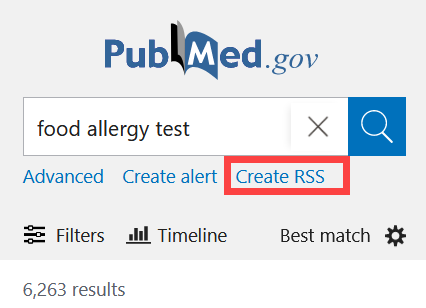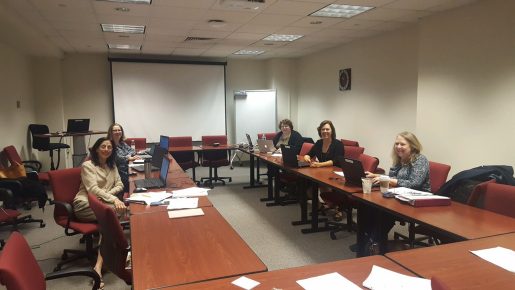
The ability to create an RSS (Really Simple Syndication) feed is available in the new PubMed. The “Create RSS” link is available after running a search (see Figure 1).

The ability to create an RSS (Really Simple Syndication) feed is available in the new PubMed. The “Create RSS” link is available after running a search (see Figure 1).
The HSLS Staff News section includes recent HSLS presentations, publications, staff changes, staff promotions, degrees earned, etc.
Names in bold are HSLS-affiliated
News
Helenmary Sheridan, Data Services Librarian, has been promoted to Librarian II, which expands her role as Data Services Librarian to provide support in the health sciences on open science and enhancing research reproducibility.
Publications
A. Alipour, S. Gabrielson, Research and Instruction Librarian, and P.B. Patel, published, “Ingestible Sensors and Medication Adherence: Focus on Use in Serious Mental Illness,” in Pharmacy (Basel), June 16, 2020; 8(2):E103.
K. Gau, P. Dillon, T. Donaldson, S. Wahl, and C. Iwema, Coordinator of Basic Science Services, published, “Partnering with Postdocs: A Library Model for Supporting Postdoctoral Researchers and Educating the Academic Research Community,” in the Journal of the Medical Library Association, 2020, 108(3):480–486. Continue reading
Due to recent University of Pittsburgh restrictions, HSLS will be offering all classes online until further notice.
Painless PubMed, Monday, August 3, 10–11 a.m.
Advanced PubMed, Tuesday, August 4, 8:30–10 a.m.
Crafting a Data Management Plan, Thursday, August 6, 12–1 p.m.
Genetic Variation, Wednesday, August 12, 10 a.m.–3:30 p.m.
Learn Your Library: A Virtual Introduction to HSLS, Tuesday, August 25, 11 a.m.–12 p.m.
When the foundational MEDLINE list of core clinical journals was introduced in 1970, it served as a practical subset of essential, clinically-oriented journals for searchers and librarians. Since then, it has never been comprehensively updated. Two HSLS librarians, Michele Klein-Fedyshin, MSLS, and Andrea Ketchum, MLS, (emeritus), evaluated these journals for their clinical utility in a 2014 study and found it suboptimal. This data-driven study resulted in a Medical Library Association (MLA) committee tasked with revising the Core Clinical Journals (CCJ) filter with Michele and Andrea as co-chairs. With PubMed now containing over 30 million citations for biomedical literature, the need for a clinically-oriented subset has never been greater.
Having no records describing how the initial list originated, Michele and Andrea examined which subjects to cover as the first step. The committee collected data about actual clinical journal use in hospital and health system libraries. Then, using publicly available patient discharge data, they looked at the diagnoses prompting the most hospital admissions and other patient data driving healthcare demand. These two factors, journal usage and patient-driven counts, determined the subjects for the new Core Clinical Journals list. A graduate statistics student at the University of Pittsburgh calculated distributions and a parallel analysis. Thirty-three new subjects were added including anti-infective agents, mental health topics, nephrology, substance-related disorders, and women’s health.

![]() For 20 years, the University of California-Santa Cruz Genome Browser (UCSC Genome Browser) has provided free public access to the human genome assembly and the information it contains via a comprehensive and well-utilized graphical viewing tool. Developed and maintained by the Genome Bioinformatics Group within the UCSC Genomics Institute, it has grown over the years to include a large collection of tools for viewing, analyzing, and downloading data from a broad array of vertebrate and model organism assemblies and annotations.
For 20 years, the University of California-Santa Cruz Genome Browser (UCSC Genome Browser) has provided free public access to the human genome assembly and the information it contains via a comprehensive and well-utilized graphical viewing tool. Developed and maintained by the Genome Bioinformatics Group within the UCSC Genomics Institute, it has grown over the years to include a large collection of tools for viewing, analyzing, and downloading data from a broad array of vertebrate and model organism assemblies and annotations.
The UCSC Genome Browser group recently created a three-part video series designed to explain the Browser to new users. Previous videos primarily focused on answering specific task-related questions for experienced users and introducing new features. This new series fills in the background with more basic information. Continue reading

In these uncertain times, there is undoubtedly an increased need for readily available information. When visiting a website, a user can become overwhelmed trying to find relevant information in a short amount of time. Social media accounts can be updated quickly and often provide real-time information, like modified operating hours or services that have been moved remotely, newly added resources, or upcoming events. For some people, turning to the social media account of a business, institution, or in this case, the Health Sciences Library System can provide them with quick updates and information without the need to browse an entire website. HSLS has an official presence on Twitter (@HSLSPitt), Instagram (@HSLSPitt), and Facebook (@PittHSLS).
The Micromedex Pediatrics and NeoFax Apps can be accessed through the HSLS Mobile Apps website. Both apps contain evidence-based, fully referenced information. The NeoFax App includes neonatal-specific drug information to efficiently and safely manage drug therapy for neonatal patients. The Pediatrics App is a reliable source for drug therapy for pediatric patients.
On the Mobile Apps website, you will find:
The HSLS Staff News section includes recent HSLS presentations, publications, staff changes, staff promotions, degrees earned, etc.
Names in bold are HSLS-affiliated
News
Carrie Iwema, Coordinator of Basic Science Services, was selected as an ASAPbio Fellow for the term June-November 2020. She is one of 26 global fellows.
Publications
Z. Wang, L.E. Pascal, U.R. Chandran, S. Chaparala, Bioinformatics Specialist, et al., published “ELL2 Is Required for the Growth and Survival of AR-Negative Prostate Cancer Cells” in Cancer Management and Research, 2020, 12:4411-4427.
Due to recent University of Pittsburgh restrictions, HSLS will be offering all classes online until further notice.
Gene Regulation, Wednesday, July 1, 10 a.m.–3:30 p.m.
Preprints: How, Why, and Should I?, Tuesday, July 7, 2:30–3:30 p.m.
Painless PubMed, Wednesday, July 8, 10–11 a.m.
Explore Data with Simple Tables in Excel, Thursday, July 9, 11 a.m.–12 p.m.
Advanced EndNote, Friday, July 10, 1–2:30 p.m.
Graphic Design with Canva, Monday, July 13, 10–11 a.m.
Basic EndNote for Macs, Tuesday, July 14, 3–4 p.m.
Bulk RNA-Seq., Wednesday, July 15, 10 a.m.–3:30 p.m.
Getting Systematic About Systematic Reviews, Thursday, July 16, 1–2 p.m.
Basic EndNote, Friday, July 17, 10–11 a.m.
Get Your Research Published, Monday, July 20, 12–1 p.m.
Visual Abstracts, Tuesday, July 21, 11 a.m.–12 p.m.
Introduction to R, Thursday, July 23, 11 a.m.–1 p.m.
Painless PubMed, Friday, July 24, 10–11 a.m.
Scientific Drawing with Illustrator, Monday, July 27, 2:30–4 p.m.
Command Line Basics, Tuesday, July 28, 10 a.m.–12 p.m.
Genetic Variation, Wednesday, July 29, 10 a.m.–3:30 p.m.
Choosing a Citation Manager, Thursday, July 30, 10–10:30 a.m.
HSLS Data Services and the Molecular Biology Information Service created online portals to help researchers quickly find the information they need to address questions about SARS-CoV-2 and COVID-19.
The Data Management: COVID-19 Research Data guide includes lists of general and clinical repositories. These linked resources are COVID-19-specific portals for sharing, discovering, reusing, and citing COVID-19 data and code.
The HSLS MolBio COVID-19: resources guide includes categories of linked resources: Trending Research Articles, Research Article Collections, Information Hubs, Molecular Data, and Webinars & Videos. Continue reading
While critically appraising papers has always been important, a recent increase in both preprints and published research (such as COVID-19-related studies) has made it even more essential to carefully evaluate study claims and methodology. HSLS is now offering “Online Introduction to Critical Appraisal” on Tuesday, June 30, from 1 p.m.-2:30 p.m. See the class description below to learn more.
Introduction to Critical Appraisal
Critical appraisal is an essential skill, one that helps readers detect whether a study’s results are valid and whether they can be applied clinically. This class will cover the basics of critically assessing studies, including study design, methods, bias, and other statistical considerations. Continue reading
HSLS liaison librarians are integrated into the schools of the health sciences. Liaison librarians provide instruction as part of the curriculum, guest lectures, and customized orientation sessions; offer recommendations for embedding streaming media and other HSLS resources into course syllabi; collaborate on research projects; provide assistance with researching health and biomedical topics; and offer guidance with scholarly publishing. Liaisons also concentrate on meeting an important research need, such as data science, molecular biology, or IACUC protocol development that spans across the health sciences. Librarians are an integral part of the health sciences community and work closely with faculty and students to support research and scholarship activities.
During COVID-19, HSLS librarians are expanding support to the health sciences. The physical locations of offices may have changed, but through remote technologies, librarians are finding ways to increase collaboration with members of the health sciences community. Faculty have already taken advantage of online consultation services, often opting to schedule a Zoom interaction in place of e-mail correspondence. Recognizing that many within the Pitt community are interested in enhancing professional skills, librarians have not only responded by increasing the number of remote instruction sessions, but have added new topics including: Continue reading
 Due the current pandemic, streaming video has taken on a new importance. Now might be an appropriate time to call attention to the HSLS Streaming Media web page. The page currently gives access to well over 10,000 streaming videos—a number which continues to grow daily as providers add new content—plus more than 2,700 (and counting) HSTalks audio interviews with slide presentations. Of particular note during the current pandemic are a pair of special resources about the coronavirus: the JoVE Coronavirus Free Access Resource Center and the HSTalks SARS-CoV-2 Audio Interviews. Both are featured in the top two carousel presentations on the web page. In the case of HSTalks, we continue to add talks of interest related to SARS-CoV-2 as new content becomes available. Continue reading
Due the current pandemic, streaming video has taken on a new importance. Now might be an appropriate time to call attention to the HSLS Streaming Media web page. The page currently gives access to well over 10,000 streaming videos—a number which continues to grow daily as providers add new content—plus more than 2,700 (and counting) HSTalks audio interviews with slide presentations. Of particular note during the current pandemic are a pair of special resources about the coronavirus: the JoVE Coronavirus Free Access Resource Center and the HSTalks SARS-CoV-2 Audio Interviews. Both are featured in the top two carousel presentations on the web page. In the case of HSTalks, we continue to add talks of interest related to SARS-CoV-2 as new content becomes available. Continue reading